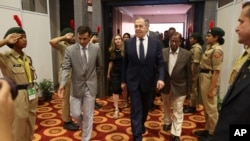Foreign ministers of the Group of 20 are convening in the Indian capital, New Delhi, amid deepening geopolitical tensions sparked by the war in Ukraine that pose a challenge to efforts at consensus among the world’s biggest economies.
The scheduled attendees include U.S. Secretary of State, Antony Blinken, Russian Foreign Minister Sergey Lavrov and Chinese Foreign Minister, Qin Gang among others.
Besides the Ukraine war, tensions between Washington and Beijing have also flared after the U.S. shot down a suspected Chinese spy balloon over its east coast last month.
India’s foreign ministry said the war in Ukraine will be an important part of the talks that will take place on Thursday.
"Yes, given the nature and the developing situation in the Russia-Ukraine conflict, naturally that will be an important point of discussions," India’s foreign secretary, Vinay Kwatra, told a news conference on Wednesday. India holds the G-20 presidency this year.
However, analysts said the foreign ministers meeting could see a replay of tensions that overshadowed a meeting of the group’s finance ministers hosted by India last week. That meeting concluded without issuing a joint statement following objections by China and Russia to language that sought to condemn Moscow’s aggression.
At the foreign ministers gathering, the United States and its allies will push the group to adopt a firm stance on the Ukraine war.
The European Union said the success of the meeting will be measured by what it could do about the Ukraine conflict. "This war has to be condemned," Josep Borrell, the European Union's high representative for foreign affairs and security policy, told reporters in New Delhi. "I hope, I am sure that India's diplomatic capacity will be used in order to make Russia understand that this war has to finish."
Russia. for its part, said it considers the G-20 a prestigious forum "where balanced consensus decisions should be made in the interests of all humankind."
A statement issued by the Russian Embassy in New Delhi late Tuesday slammed the U.S. and its allies, saying their “destructive policies” have already “put the world on the brink of a disaster, provoked a rollback in socio-economic development and seriously aggravated the situation of the poorest countries.”
Analysts said that given the deep divisions, India faces a tough challenge in forging a joint position at the end of the talks.
“It looks like it is going to be a difficult ride. The meeting will see a greater contestation over Ukraine,” according to Harsh Pant, vice president for studies and foreign policy at the Observer Research Foundation in New Delhi.
Pointing out that China and Russia blocked the joint statement at the meeting of G-20 finance ministers last week, Pant said the presence of the U.S. foreign secretary along with the Russian and Chinese foreign ministers at the same forum “will call for a difficult balancing act by India to deliver a G-20 outcome.”
Despite the diplomatic challenge it faces, India expressed optimism the meeting will focus on problems being faced by many countries such as food, energy and fertilizer security – issues New Delhi has been pushing during its G-20 presidency.
“What is the understanding they develop, not just on Russia-Ukraine conflict but also the impact of that on the rest of the world, the challenges the developing countries face, those are equally important to focus on,” Kwatra said.
In all, representatives of 40 countries, including some that are not members of the bloc, such as Bangladesh, and multilateral organizations are due to participate in the meeting.
A gathering of foreign ministers of the Quad countries – the United States, India, Australia and Japan – is scheduled on the sidelines in New Delhi. The Quad is an alliance of countries that want to check China’s growing assertiveness in the Indo-Pacific region.






